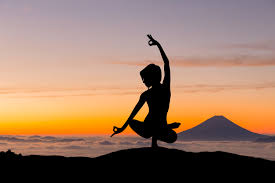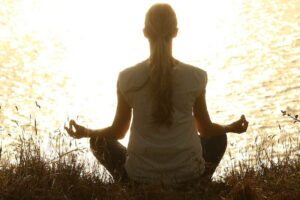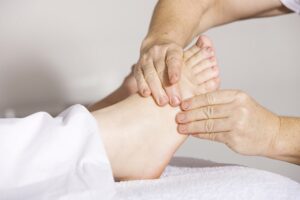Anxiety can be a debilitating condition that affects millions of people worldwide. While medication can be effective in managing symptoms, many individuals are turning to holistic therapy techniques as a natural and complementary approach to anxiety treatment. In this blog, we’ll explore various holistic therapies for anxiety, including their benefits. We will also help you to identify when to seek therapy.
Contents
What Is Holistic Therapy?
 Holistic therapy is an approach to managing anxiety that considers the whole person, rather than just the symptoms. It involves looking at the underlying causes of anxiety and using a range of techniques to improve overall well-being. These techniques aim for a holistic approach to reduce stress, promote relaxation, and improve mental and physical health. It’s important to note that holistic therapy should be used in conjunction with professional medical treatment. Also, seeking help from a licensed healthcare provider is essential for managing severe anxiety or other mental health issues.
Holistic therapy is an approach to managing anxiety that considers the whole person, rather than just the symptoms. It involves looking at the underlying causes of anxiety and using a range of techniques to improve overall well-being. These techniques aim for a holistic approach to reduce stress, promote relaxation, and improve mental and physical health. It’s important to note that holistic therapy should be used in conjunction with professional medical treatment. Also, seeking help from a licensed healthcare provider is essential for managing severe anxiety or other mental health issues.
Benefits Of Holistic Therapy
Here are some benefits of holistic therapy:
- Comprehensive well-being: Holistic therapy addresses the mental, emotional, physical, and spiritual aspects of an individual, promoting overall well-being.
- Reduces stress: Holistic therapy techniques such as meditation, yoga, and massage can help reduce stress levels and promote relaxation.
- Enhances physical health: Holistic therapy techniques can help reduce physical symptoms of stress and anxiety, such as headaches, muscle tension, and insomnia.
- Promotes self-awareness: Holistic therapy techniques can help individuals become more self-aware, identify triggers, and develop strategies to manage symptoms.
- Encourages lifestyle changes: Holistic therapy encourages individuals to make positive lifestyle changes such as exercise, nutrition, and relaxation, which can improve overall health and well-being.
- Personalized approach: Holistic therapy is tailored to the individual, and therapists work with their clients to develop a personalized treatment plan that meets their unique needs.
- Combination with traditional medical treatments: Holistic therapy can be used alongside traditional medical treatments to enhance their effectiveness and promote overall health and well-being.
- Reduces reliance on medication: Holistic therapy can reduce the reliance on medication, providing natural alternatives to manage mental and physical symptoms.
- Promotes long-term health: Holistic therapy techniques can promote long-term health by addressing underlying issues and providing tools to manage symptoms.
Types Of Holistic Therapy
Given below are some examples of holistic therapy techniques that can help with anxiety:
Mindfulness Meditation

Mindfulness meditation involves focusing your attention on the present moment without judgment. It can help you become more aware of your thoughts and feelings and positively manage them. Meditation allows the mind to calm down and get away from the everyday hustle-bustle. This type of therapy has been practiced for ages and is recorded in Ayurveda and Traditional Chinese and Tibetan Medicines.
Yoga
Yoga is a mind-body practice that combines physical postures with deep breathing and meditation. It has been shown to reduce anxiety and stress by promoting relaxation and improving overall physical and mental health. Postures of Yoga help in stretching body muscles. While, deep breathing helps in relaxation and calming senses, ultimately reducing anxiety. Practicing Yoga can increase oxygen levels in the blood as well, which helps to stay active for the entire day.
Acupuncture
Acupuncture involves inserting thin needles into specific points on the body to balance the flow of energy. It can help reduce anxiety by promoting relaxation, improving sleep quality, and reducing physical symptoms such as muscle tension and headaches. By stimulating the body’s natural healing mechanisms, acupuncture can help individuals develop greater self-awareness and emotional regulation, which can reduce the impact of anxiety.
Aromatherapy

Aromatherapy involves using essential oils to promote relaxation and reduce stress. Certain scents, such as lavender and chamomile, are effective in reducing anxiety. By inhaling essential oils or using them in massage or bath products, the sensory nerves in the nose send a signal to the brain. This helps us to experience a sense of calm and relaxation that can reduce the impact of anxiety.
Cognitive-behavioral therapy (CBT)
CBT is a type of talk therapy that can help people with anxiety learn to manage their thoughts and behavior. It involves identifying negative patterns of thinking and developing coping strategies to deal with them. This therapy is based on the idea that how we think and act impacts a lot on how we feel. Hence, in this therapy, the therapist focuses to change the negative thinking patterns of the patient.
Herbal Supplements
Herbal supplements are a holistic therapy technique that involves using natural plant-based products. Certain herbal supplements, such as chamomile, valerian root, and passionflower, have been shown to have calming effects and can help reduce anxiety. However, not all herbal supplements are safe or effective for everyone. Also, it’s important to talk to a healthcare provider before starting any new supplements.
Massage Therapy

Massage therapy involves applying pressure to the muscles and soft tissues of the body to promote relaxation and reduce tension. It can help reduce anxiety by promoting relaxation and reducing physical symptoms such as muscle tension and headaches. By increasing blood flow and releasing the tension, massage can help individuals feel more grounded and centered.
When To Seek Therapy For Anxiety?
Feeling nervous or worried at times is normal. However, if fear and anxiety start taking over your normal functioning, you might need therapy. Consider a therapy:
- If you are experiencing excessive worry, fear, or panic attacks, but are not able to identify the reason.
- If your anxiety is causing physical symptoms such as muscle tension, headaches, or digestive issues.
- If your anxiety is interfering with your ability to sleep or disrupting your sleep patterns.
- If you are avoiding certain situations or social activities.
- If you are using a lot of medicines, alcohol, or drugs to cope with anxiety.
- If you have a history of trauma or other mental health conditions.
- If you are experiencing relationship or work problems due to anxiety.
Conclusion
In conclusion, holistic therapy techniques can be a natural and complementary approach to managing anxiety. By addressing the root causes of anxiety and promoting overall mental and physical health, individuals can reduce their symptoms and improve their overall well-being. It’s important to work with a healthcare provider or mental health professional to determine the best approach for your individual needs and preferences. By taking a holistic approach to anxiety management, individuals can empower themselves to take control of their mental health and achieve a more balanced, fulfilling life.
For more information, please contact MantraCare. Anxiety is a common mental health condition characterized by persistent feelings of worry, fear, and apprehension. If you have any queries regarding Online Anxiety Counseling experienced therapists at MantraCare can help: Book a trial Anxiety therapy session.


